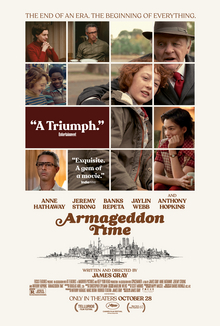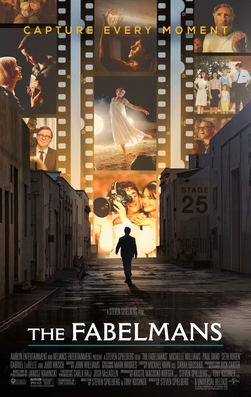Oscar season is upon us and as all the prestige movies roll into theaters, we have two semi-autobiographical films about the directors' childhoods. Both men are grappling with Jewish identity and families who don't fully support their artistic endeavors, but they still put their individual stamp on these films to make unique and compelling cinema.
Armageddon Time: Written and directed by James Gray, this film is a perfect snapshot of 1980 in the life of Paul (Banks Repeta), a sixth-grader growing up in Queens, New York. He loves to draw and dreams of being a famous comic book artist, but his dreamy nature means that he doesn't do particularly well in public school and keeps getting into trouble. He befriends a young Black boy, Johnny (Jaylin Webb), who has already been labelled a troublemaker by their teacher and most other adults; what follows is a story of the tenuous friendship between these two kids, and the many ways in which the system always fails Johnny while giving Paul multiple chances to succeed.Paul's family life is portrayed by a who's who of actors, with Jeremy Strong playing his taciturn father, Irving, who is prone to bouts of violence and has a massive chip on his shoulder, and Anne Hathaway as his overwhelmed but ambitious mother, Esther. All they want is for their sons to succeed in life and have a better life than they did, and they have the support of Esther's father, Aaron, played with overwhelming kindness and generosity by Anthony Hopkins. Aaron is the only family member who truly sees Paul and his dreams, and he encourages him to be the best person he can be. But as the movie proceeds, it becomes clear that even his grandfather's support is somewhat rhetorical and will always take a backseat to the practical considerations of ensuring Paul can have a better life.
This movie imbues every character with nuance, never painting anyone as an abject villain (well, except for cops and teachers, who very literally divide the world into black and white). Instead, there are many grey areas to navigate here, and Paul quickly comes to learn that having the best of intentions still cannot translate to the best actions and outcomes. It's a somewhat heartbreaking tale, but there's also a great deal of hope in it. And the fact that we know this is semi-autobiographical means that I left the theater with a sense that here was a man who, like that little boy, is still trying to do the right thing. It's up to you as the audience member to decide whether or not he succeeds.
The Fabelmans: Directed by Steven Spielberg, who co-wrote the screenplay with Tony Kushner, this is the story of Sammy Fabelman, a young Jewish boy in the 1950s who we follow as a young boy to his first years in college as his family moves from New Jersey, to Phoenix, to California in service of his father's job. His parents, Burt and Mitzi, are played by the wonderful Paul Dano and Michelle Williams, and while they are both very loving, they take different tacks in supporting Sammy's burgeoning love for film and cinema. His father, an engineering genius who is the family's breadwinner, wants his son to be sensible, and stable, and go to college instead of indulging in this "hobby." While his mother, a woman who could have been a concert pianist but instead chose the traditional path and became a housewife, encourages him to be an artist and follow his dreams.This is a movie about the push and pull between art and responsibility, the outsize influence our families have in shaping our lives when we are younger, and the turbulence and turmoil of adolescence. There's a lot of family drama (and at times comedy) here, but I found myself unmoved by those emotional machinations. There is a lot of attention paid to how Sam's movies make the people around him feel, but for me, this movie was such a piece of technical brilliance that I found myself simply captivated by its story about filmmaking, and couldn't be bothered about the humans.
There are long, loving scenes of spooling and unspooling and splicing film, making cuts and edits, finding the right piece of music to score, indulging in different genres, finding novel techniques to achieve special effects, coaching your actors to get just the right emotion. It's a master class in directing - you're watching the novice Sammy learn how to direct, but because Spielberg is directing this movie, you're benefitting from the fact that he is now this incredible, seasoned director who knows exactly how to tell this story about his younger self. There are scenes where he simply lingers on Michelle Williams' face as she watches a film, or shows how the pulse in someone's neck slowly fades away, or suddenly veers into an homage to West Side Story in the movie's final act when Sammy becomes a high schooler. It's almost Inception-esque, with films within films, and directing within directing.
The final shot of this movie made me laugh. That's all I'll say. But as far as I'm concerned, it is the most memorable and classic way to end this film - that one shot captures everything I've said about the winking, meta nature of the script, and serves as a reminder of how lucky we are to still have Steven Spielberg directing movies.


No comments:
Post a Comment